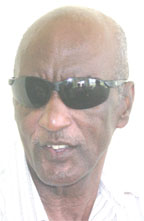– says blind cricket is here to stay
Clevedon Mayers was re-elected president of the West Indies Blind Cricket Council (WIBCC) when that body staged its annual general meeting (AGM) last week.
Anthony Avril will serve as vice-president with Bowani Persaud the General Secretary.
Emily Lynch is the Assistant General Secretary while Theresa Pemberton is the treasurer.
Skipper of the Jamaican team, eventual winners of this year’s fourth Regional Blind Cricket Tournament, Toussaint Gardner was elected Public Relations Officer.
According to Mayers his organisation wishes to use cricket as a catalyst for encouraging the wider community to support blind persons.
“Basically although we play blind cricket we want to use cricket as a catalyst for the development and empowerment of the individual, we don’t want the person just to play the game. The game can encourage the individual to develop leadership skills, to develop team work, to develop the ability to go on to other things in life,” he said.
As it relates to the structure of the game, the 40-overs-a-side version will be maintained, but 20/20 matches will also be played whenever possible.
Last week the tournament got off to a rocky start due to inclement weather.
The situation was subsequently considered at the AGM and it was decided that the tournament could be pushed back as far as May to avoid weather conditions that July and August bring.
The council has maintained a relentless attitude towards funding their sport and has already established contacts with government and business places for capital.

While the West Indies Cricket Board is responsible for all cricket in the region, the council took it upon themselves to tap into resources while hoping to build a relationship with the board.
“One of the other important things is that in terms of cricket within the Caribbean the West Indies Cricket Board is responsible for all aspects of cricket in the Caribbean.
In fact, in England, blind cricket is now played under the English Cricket Board and not under the Blind Cricket Association. However, we still have our own autonomy but we have to build a relationship with the West Indies Cricket Board.”
They also hoped to recruit more spectators to the sport through electronic scoring, making it easier for persons to follow a blind cricket match.
Mayers expressed enthusiasm about the work GUYBCA has done but said the association was capable of achieving more and needed to continue its relationship with government.
Meanwhile, the World Blind Cricket Council (WBCC) and WIBCC are working together to implement anti-doping testing in the sport. It has not yet been an issue but the organisation is seeking to highlight the seriousness of the sport, maintaining it to be as authentic as any other recognized sport.





